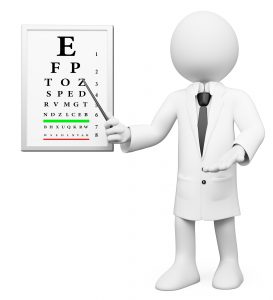Visual problems may predate Acquired Brain Injury. Information relating to the person’s visual acuity (clarity of vision) prior to their brain injury should be accessed as soon as possible after admission to hospital. The person should be supported to wear prescribed glasses if possible. It is important that an assessment of visual abilities is carried out post brain injury as soon as possible to ensure that the previous prescription is still suitable. Other visual problems may arise following brain injury as described below which may impact on the person’s abilities. Previously prescribed glasses may therefore not be successful in correcting the full spectrum of visual problems post brain injury, though they may still support pre-existing visual acuity deficits.
Following brain injury visual problems are common and can arise from disruptions to the visual pathway (the nerves running from the eyes to the visual cortex within the occipital lobes) and/or damage to the visual processing and perceptual areas of the brain. Visual problems may also result from changes to the motor control of the eye muscles (oculomotor impairment). Impairments may affect one or both eyes.
After brain injury, damage to the visual pathway may cause visual field impairments which may result in loss of sight in part of the person’s field of vision. Different types of visual field impairment can arise depending on the location of the injury within the brain. This problem can be difficult to identify after brain injury, many people being unaware of the problem or ascribing it to a problem with their eyes, rather than their brain. This lack of awareness may lead to repeated requests for eye tests/glasses or conversely the person may dismiss the problem as unimportant.
Cortical blindness is a condition which refers to the partial or total loss of vision caused by significant damage to the occipital lobe/lobes (rather than injury to the eyes). Symptoms of damage to the optic nerve may include blind spots (i.e. visual field deficits), blurring of vision, distorted vision and altered colour vision.
In the context of visual field impairment and cortical blindness, the eyes may still work perfectly (e.g. may be responsive to light and able to move). However, in the context of visual field impairment, the ‘transmission’ of visual information from the eye to the areas of the brain responsible for perceiving, processing, making sense of and responding to visual information is interrupted.
Damage to the areas of the brain responsible for the motor control of the muscles of the eye can cause significant visual problems as can direct damage to particular cranial nerves (i.e. ocular motor nerve – third cranial nerve, trochlear nerve – fourth cranial nerve, abducens nerve – sixth cranial nerve). Both the third and sixth cranial nerves may be damaged indirectly by complications of raised intracranial pressure following brain injury. Symptoms may include:
- Double vision.
- Ptosis (drooping eyelid).
- Deviation of the eye (convergent or divergent squint causing problems focusing).
- Nystagmus (involuntary, rhythmical movements of one or both eyes).
- Impaired eye movements which can affect the ability to look in particular directions and scan the environment.
Implications of significant visual deficits may lead to difficulties with many activities of daily living. Examples include:
- Performing everyday tasks (e.g. cooking, washing, walking).
- Reading.
- Navigating the environment.
- Driving/cycling.
- Crossing the road.
- Watching TV.
- Communication (e.g. seeing facial expression and gesture, reading, using Augmentative and Alternative Communication Aids.
- Participation in educational, occupational and social activities.
Some people may report problems with light sensitivity (photophobia) following brain injury (the person experiences discomfort/distress/pain in response to normal levels of light or glare). It is important to recognise that there may be a number of significant contributory factors in the development of light sensitivity following brain injury, please click on the link above for further information.
All visual problems following brain injury may result in the person experiencing considerable anxiety, distress, headache and fatigue.

It is important that visual deficits are recognised and appropriate referrals made for assessment to relevant professionals including Ophthalmic Optician, Optometrist, Ophthalmologist and/or Neuro-Ophthalmologist.
